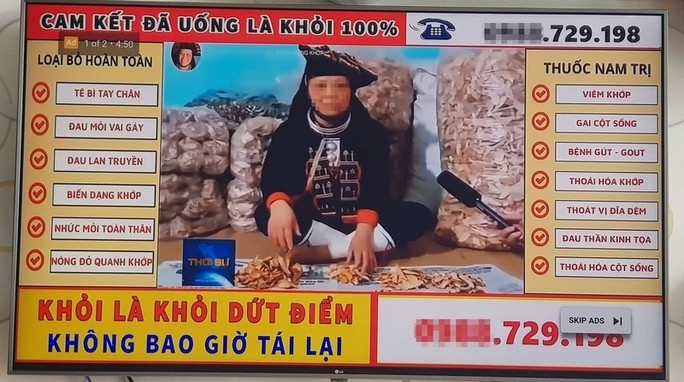Artists, people with certain influence on the public, have made advertising clips that exaggerate or misrepresent products and brands, causing outrage in public opinion.
Recently, on many social networking sites such as Facebook, YouTube, TikTok, etc., viewers have seen numerous advertising clips that exaggerate products and brands. From drugs, functional foods to cosmetics of unknown origin...
In these clips, there are many artists and influencers in a number of fields participating in advertising.
False and untrue advertising on social networks has caused public outrage.

False advertising is rampant online. (Illustration photo)
According to lawyer Cao The Luan, Kao Kien Law Firm LLC, false advertising is a prohibited act as stipulated in laws, circulars and decrees.
Specifically, Article 8 of the 2012 Advertising Law, amended and supplemented in 2018, stipulates prohibited acts, including: "Incorrect or misleading advertising about the business capacity, the ability to provide products, goods and services of organizations and individuals trading in products, goods and services; about the quantity, quality, price, uses, design, packaging, trademark, origin, type, service method, warranty period of products, goods and services that have been registered or announced".
False advertising can be fined from 60 to 80 million VND, according to Clause 5, Article 34 of Decree No. 38/2021/ND-CP.
False advertising can also be prosecuted under Article 197 of the 2015 Penal Code (Crime of False Advertising).
Lawyer Le Thi Huyen Trang, Ho Chi Minh City Bar Association added that in order to protect consumers from using correctly and safely products, goods and services related to advertising, depending on the motives and purposes of the organization or individual when carrying out "false advertising", "providing false information", "using other deceitful tricks", the review and handling of such acts are stipulated in Articles 197 of the crime of False Advertising and Article 198 of the crime of Customer Fraud.
Thus, depending on each specific violation and level of violation, the authorities will consider applying the appropriate crime.
In both of the above crimes, the organization or individual providing products, goods, or services using individual artists or people with certain influence in certain fields (collectively referred to as celebrities) will be prosecuted as the mastermind and organizer of the crime, while the celebrity may be considered an accomplice in the role of an assistant.
According to Laborer